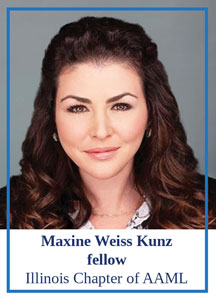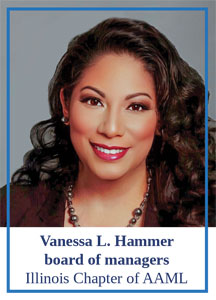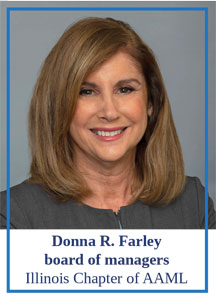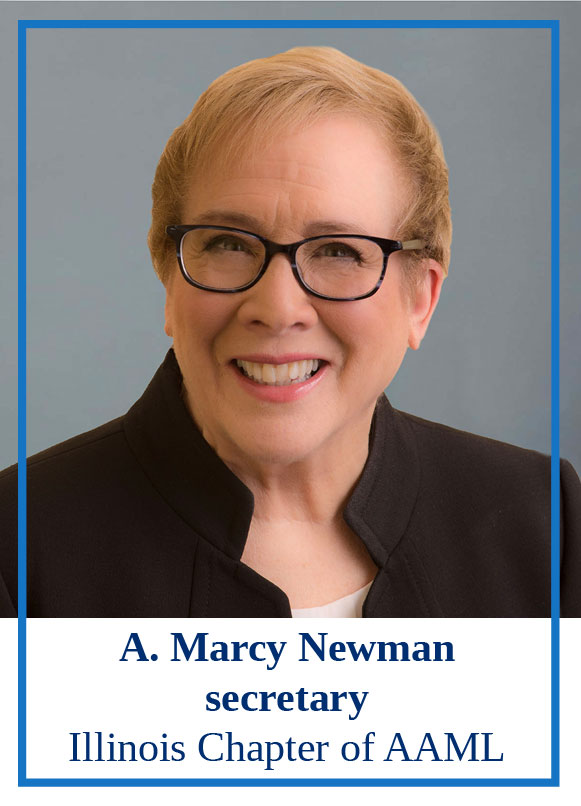Managing the Dollars and Sense of Divorce
Illinois Fellow
American Academy of Matrimonial Lawyers
July 2022

Jenny, a successful CEO, retains counsel for her contentious divorce from Bruce, a stay-at-home father. Jenny and Bruce have had their share of disagreements over the years, mostly related to their financial responsibilities: Jenny pays all the recurring bills, while Bruce uses their joint account to handle larger, one-time expenses and their children’s everyday needs.
Fueled by her belief that Bruce devalues her financial contributions—and oblivious to the best interest of the kids—Jenny reacts by refusing to adopt a temporary support plan or even a temporary parenting schedule.
Bruce’s extremely litigious attorney responds by filing one emergency motion after another. This onslaught of motions unnerves Jenny; normally calm and collected, she calls and emails her attorney every day, racking up hours. But she forgets to tender her financial discovery documents—which prompts her husband’s attorney to file more motions, this time for compliance. These actions harden Jenny’s refusal to compromise on even small requests from her husband.
Jenny initially paid her attorney a $7,500 retainer; one month later, the retainer is exhausted. In fact, Jenny now owes the firm another $1,500. She is exasperated. How could this happen in only four weeks of litigation?
This hypothetical case will ring true for every family law attorney and offers important guidance for matrimonial-law clients as well. When people getting a divorce focus so much on “winning” each small point, they overlook the big picture. And then they are shocked to discover they have squandered their retainer. Suddenly, the budget for their divorce has doubled (or more).
The subject of fees can strain any lawyer-client relationship, but family law cases seem to supercharge the situation, for two main reasons.
- Family law proceedings offer no clear answers to the most frequent client questions: “How long will this take?” and “How much will this cost?” The answer is, “It depends.”
Clients may read these exchanges as a legal song-and-dance. But family law encompasses more variables than most other practices: current financial transparency, contingency planning, child-related matters and especially the actions of the family itself. Clients’ own behavior greatly influences how much they will spend on legal fees. - During divorce proceedings people are at the most stressful juncture of their lives, and skeletons can practically come tap-dancing out of the closet. The process can be embarrassing and depressing. Many clients wonder why an attorney should charge additional fees to take them through this house of horrors; it’s easy to see how emotions rise as fees mount.
But skilled, thorough representation is essential in family law. The Courts have wide discretion when it comes to rules and procedures, especially with regard to evidence. Unclear decrees cause havoc for subsequent determinations that rely on the original settlement. Attorneys must be hyperalert to these issues for clients’ protection, and clients should be prepared to compensate their attorney fairly and promptly.
The divorce process need not break the bank: clients can manage costs by avoiding unreasonable or time-consuming demands. They also should know what they can't and can control in the divorce process.
What is not within a client's control? The personality of their spouse or partner; the personality of the opposing attorney; and the Court system itself, including the presiding judge.
What is within a client's control? Clients can respond quickly and concisely to queries. Clients can minimize communication with their attorney by consolidating their questions into succinct emails and making fewer phone calls. They also control decisions about when and where to compromise—or even if they want to go to Court at all. (The cost of litigation far exceeds that of mediation.)
Each client has the obligation to handle their own financial responsibility to their lawyer. Surprisingly, this is not as clear-cut as it might seem. In their effort to manage costs, some clients seek to negotiate lower fees with their attorney—something they would rarely attempt with accountants, doctors, plumbers or any other professional providing a valuable service at an established rate.
Perhaps this stems from the drawn-out nature of many family law proceedings, in which the finish line can be hard to see as the costs add up. These matters may be second nature to lawyers, but to most clients they're terra incognita. It falls to family law attorneys to set expectations at the outset and then reinforce guidelines for making good decisions as well as containing costs.
Of course, attorneys should encourage clients' questions about their bills and then explain, clearly and without umbrage, the actions taken on their behalf. By helping clients foresee and manage their expenses, we promote a level of trust that fortifies attorney-client partnerships.
This includes conveying the one great truth about the divorce process—that in terms of emotions and finances, it is a marathon, not a sprint.

Reach her at khmickelson@beermannlaw.com or at 312.621.9700

 Why did you apply to become a Fellow of the AAML?
Why did you apply to become a Fellow of the AAML?
 Why did you apply to become a Fellow of the AAML?
Why did you apply to become a Fellow of the AAML? What do you find rewarding about being a Fellow of the AAML?
What do you find rewarding about being a Fellow of the AAML? What do you find rewarding about being a Fellow of the AAML?
What do you find rewarding about being a Fellow of the AAML? What do you find most rewarding about being an AAML Fellow?
What do you find most rewarding about being an AAML Fellow?



 What do you find rewarding about being a Fellow of the AAML?
What do you find rewarding about being a Fellow of the AAML? What are you most looking forward to in the following year, personally and or professionally?
What are you most looking forward to in the following year, personally and or professionally?


 What area of family law do you find most interesting?
What area of family law do you find most interesting? Why did you apply to become a Fellow of the AAML?
Why did you apply to become a Fellow of the AAML? Why did you apply to become a Fellow of the AAML?
Why did you apply to become a Fellow of the AAML? Why did you apply to become a Fellow of the AAML?
Why did you apply to become a Fellow of the AAML?








